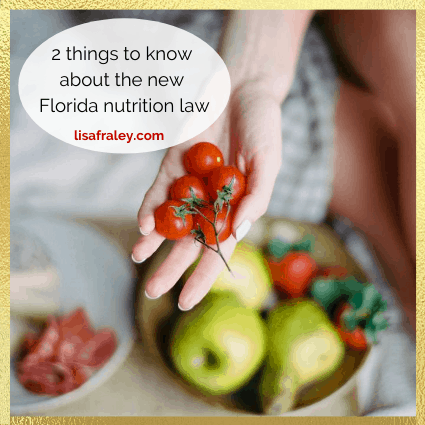2 things to know about Florida’s new nutrition law
As a health coach or holistic practitioner, you may have heard that the Florida nutrition law has changed from a red state to green state…and you are correct!
I’ve been talking about it a lot lately because it’s such a HUGE change to the law.
Whether you’re located in Florida or not, I always want you to be updated about legal changes that could affect your work. Since I’m all about Legal Love™, it’s my mission to educate about how to reduce your legal risk.
Even though the Florida nutrition law is more lenient now, there are 2 BIG things to know about Florida’s new nutrition law so you don’t get in trouble.
(Psst! Not in Florida? This information still applies to you! Keep reading.)
Under Florida’s new nutrition law:
1. You can’t call yourself a “nutritionist”, “dietician”, or “nutrition counselor” and other specific titles.
You now CAN use the word “nutrition” in the State of Florida (yay!), but Florida’s law does protect the use of certain titles.
If you’re a health coach or holistic practitioner in Florida, the new law says that you CAN’T call or represent yourself as a “dietician, licensed dietician, registered dietician, nutritionist, licensed nutritionist, nutrition counselor, or licensed nutrition counselor, or use any word, letter, symbol, insignia indicating or implying that he or she is a dietician, nutritionist, or nutrition counselor.” This means you can’t use abbreviations like “RD” or “LN” if you haven’t earned those titles.
In fact, most state nutrition laws protect certain titles.
For example, many states say that you can’t call yourself a “dietician” or “registered dietician” or even “nutritionist” or “licensed nutritionist” unless you’ve completed certain requirements to do so. This isn’t just limited to Florida. Your state may have this law in place too.
Your Action Step: What’s your title? What do you call yourself? Make sure you’re not violating your state law so make any changes to your website, social media, business cards (um, do we even still use them??) to be sure use of your title is allowed in your state.
(Not sure what your state law says? You can learn how to find out what it says through this Legal Master Class here.)
2. If your client has been diagnosed with a medical disease or condition AND is currently working with a medical doctor where nutrition care is part of the treatment, you CAN’T work with that client.
I know. This part of the law seems harsh. This is a REALLY important requirement.
The new Florida law requires that if your client is under the current, direct care of a medical doctor for a diagnosed disease or condition in which nutrition intervention has been prescribed as a treatment, you are not allowed to work with that client because the doctor is ALREADY working with that client around nutrition and diet.
This raises a lot of questions, of course.
I can hear you saying, “But, Lisa, what does that mean? Does it mean we can’t collaborate with a doctor to help a client? Can a doctor refer the client to me for more support? How does that work?”
Those are EXACTLY the questions you should be asking.
Generally speaking, you want to steer clear of clients who are already working with doctors and have a nutrition plan that they’re following from their doctor.
I invite you to reach out to me or to a local attorney in Florida to help you dive deeper into the new nutrition law, but this new law is a big deal.
It’s important to know what you can and can’t do as a health coach or holistic practitioner – no matter in what state you’re located – to reduce your risk of being investigated by the state, getting fined or being shut down.
Want to know more about the nutrition laws in your state? Here are 2 options:
If you have questions, book a free 20-Minute Legal Chat with my team to share more information so we can point you in the right direction.
If you like to roll-up-your-sleeves and DIY it, check out the DIY Legal Master Class on State Nutrition Law Basics for Health Coaches and learn how to find out your own state nutrition laws.
Here’s to understanding your state nutrition laws and to reducing your risk with Legal Love!




